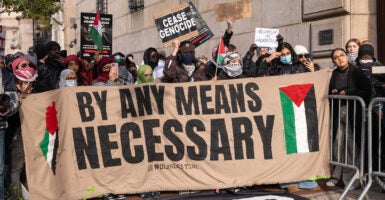One year after the most deadly day in Jewish history since the Holocaust, 3.5 million American Jews say they have experienced antisemitism, according to a recent study.
“One out of every five American Jewish children has experienced antisemitism since Oct. 7,” EJ Kimball, director of Christian engagement at Combat Antisemitism Movement, said during an event at The Heritage Foundation on Monday to mark the anniversary of Hamas’ terrorist attack on Israel.
Kimball, a father of two, said both his children have experienced antisemitism at school in the past year. According to the survey, which was conducted by Dr. Ira Sheskin of the University of Miami and commissioned by Combat Antisemitism Movement, 61% of American Jews report feeling less safe since the terrorist attack a year ago.
Hamas terrorists killed about 1,200 people, mostly Israelis, on Oct. 7, and another 250 were taken hostage. Today, 93 Israelis are still being held hostage in Gaza, including four Americans with dual citizenship.
Kimball and several other experts in the field of combating antisemitism addressed the circumstances that led to Oct. 7 and the swift rise in anti-Jewish sentiment on college campuses during Monday’s event.
How Hamas Was Able to Carry Out Oct. 7
While Hamas carried out the deadly terrorist attack, Iran sponsored it, according to Fred Fleitz, vice chair of Center for American Security at the America First Policy Institute.
“Iran is the head of the snake,” Fleitz said during a panel discussion. “Iran is funding Hamas and Hezbollah and the Houthi rebels and Shiite militias in Syria and Iraq.”
Iran had the money to fund the attack at least in part because the U.S. government gave Iran access to billions of dollars as part of a prisoner exchange and the Biden administration “ignored all the sanctions that were introduced in the previous administration, allowing [Iran to sell] oil in the market and other business activities, allowing Iran to earn another $50 to $100 billion,” according to Mort Klein, president of the Zionist Organization of America.
“The reserves went from $4 billion to $100 billion, enabling them to fund and arm Hamas and Hezbollah,” added Klein.
But Iran’s financial favor was not the only circumstance that led to Oct. 7.
In 2005, all Israeli settlements in the Gaza strip were dismantled and “that was a terrible mistake,” according to Klein. In 2007, Hamas took control of the Gaza Strip.
Hamas was also able to carry out the attack a year ago because of “[President Joe] Biden pressuring Israel to give work permits to Gaza civilians,” Klein said.
“These innocent Gaza civilians gave Hamas the routes, maps where the kindergartens were, where the schools are, the residents in each home, so they knew exactly what they were doing,” he said.
Israel should have also created a “buffer zone” between Israel and Gaza, Klein argued, adding that Israel may have missed an opportunity to destroy Hamas in 2021 after Hamas fired missiles at Israel. The Jewish state did respond, but the U.S. encouraged Israel to limit its response, which it did.
America has also given funding to the United Nations Relief and Works Agency for Palestine Refugees in the Near East, which, according to Klein, “teaches hate and violence to Arabs.”
The United States is “in part responsible for Hamas remaining strong and remaining really in existence,” Klein said.
Why Did Pro-Palestine Protests Break Out So Quickly After Oct. 7?
The bodies of dead Israelis were hardly cold following the Oct. 7 attack when pro-Palestine protests broke out on college campuses in the U.S.
“One day after that attack, these individuals started coming out and protesting Israel’s right to defend itself right here in the heart of America,” Jonathan Schanzer, senior vice president of research at the Foundation for Defense of Democracies, said during Monday’s event.
The individuals Schanzer is referring to are not so much the students protesting at Columbia University and other schools, but a group known as American Muslims for Palestine.
American Muslims for Palestine is “the group that incubated, funded, and directed Students for Justice in Palestine,” Schanzer said. Students for Justice in Palestine has organized many of the pro-Palestine campus protests over the past year.
“And, of course, we see people showing up at each one of these things—adults that have no business being on campus—and you’ve got to start to ask yourself, why?” Schanzer said.
Kimball says there has been a “colossal failure from leadership” on college campuses to call out antisemitism. The Combat Antisemitism Movement director contends that there should be consequences for students who participate in these “pro-genocidal protests” because “most of them have no idea what they’re even doing. They’re being used [and] manipulated.”
































